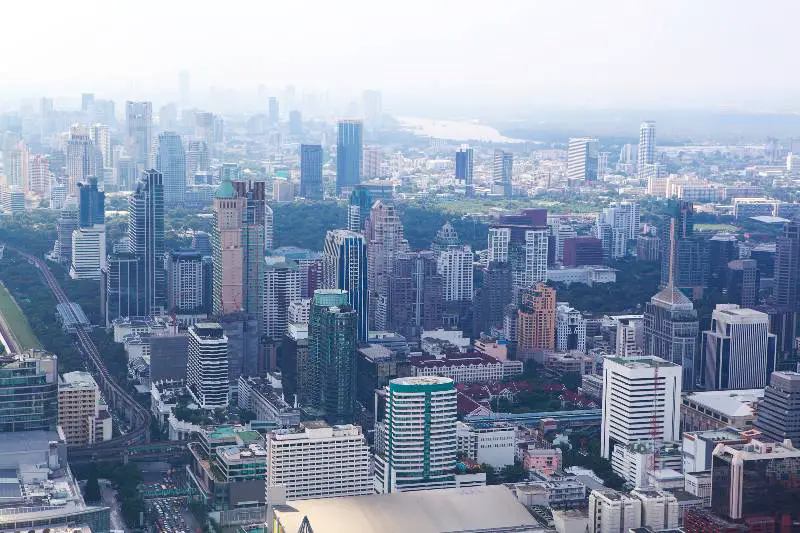Can Foreigners Buy Property In Thailand? The Complete Guide
If you’re thinking of buying property in Thailand, you’ll want to read this guide first! In it, we answer the question: can foreigners buy property in Thailand? We also provide a detailed overview of the process, so that you know what to expect. Whether you’re a foreigner looking to invest in Thai real estate or simply want to know more about the rules and regulations, this guide has you covered.
On Tuesday, November 15th, 2022, the Thai Cabinet decided that foreigners would be able to buy houses and up to one rai of land if they could show evidence of an investment of 40 million baht or more. This directive will be effective for five years after it is published in the Royal Gazette, which should happen soon according to the government.
Key Takeaways
- Strict regulations are put in place regarding what interests you can own and how they must be structured.
- Thai Cabinet decided that foreigners would be able to buy houses and up to one rai of land if they could show evidence of an investment of 40 million baht or more.
- Property purchase in Thailand requires the use of a company that has a combination of Thai and foreign ownership, with foreign ownership amounting to no more than 49% of the total.
Foreigners can own property in Thailand
Anucha Burapachaisri, the government’s spokesman after the weekly meeting of ministers on Tuesday, (November 15th, 2022) announced that the new plan, which was approved by a Cabinet meeting on Tuesday, aims to allow foreigners who meet certain criteria to own as much as one rai (0.4 acres) of land for residential purposes.
A large number of top professionals, high-net-worth individuals, and retirees will be eligible under this program for ownership of housing sites. However, such opportunities will only be available in Bangkok and Pattaya, a beachside city about two hours from Bangkok.
A number of other nations are competing to attract wealthy individuals, so-called digital nomads, retirees, and other types of individuals to Thailand. There is a new visa program that was launched by the government in September, which will allow qualified foreigners to stay for as long as 10 years with a number of benefits if they qualify.
In order to qualify for owning residential land, one must invest at least 40 million baht ($1.04 million) over a period of three years, which includes the cost of the property, according to Anucha, with the investment being a minimum of 40 million baht ($1.04 million).
Additionally, there are many other investment options available to Thai investors, including bonds issued by the Thai government, the Bank of Thailand, and state-owned enterprises, as well as fixed-income securities that are backed by the Finance Ministry in terms of principal and interest. It should be noted that certain funds, such as mutual funds and trust funds, which invest in real estate, are also qualifying for the 40 million baht minimum, according to Auncha.
The different ways foreigners can own property in Thailand
If you are looking for a more spacious home in which to spend your retirement or if you want to provide your family with the ideal location from which to enjoy vacations together, you might want to consider purchasing an entire home or villa.
However, when purchasing a free-standing development, there are additional regulations to take into consideration, and ownership of a villa offers the benefits of space, privacy, and complete control over maintenance responsibilities.
This process is simple and straightforward in general, and you should anticipate receiving an offer of a lease on any villa or home that is for a duration of thirty years; this is the maximum time period allowed for any leasehold in Thailand.
The government imposed this restriction in order to maintain control over direct foreign ownership; however, once the initial term of the lease has expired, there are very few problems with extending it for an additional thirty years. In the same vein, if you decide that now is the time to sell the property, the process involved in doing so should be just as uncomplicated.
But how do you buy land?
If you’re not a native and want to buy land/a house, you need to display certificated evidence of your investments.
The declaration foreigners can buy land and/or homes in Bangkok, Pattaya, and other residential areas inside provinces. It is forbidden for foreigners to purchase land in military zones, as the directive announced.
The steps to apply for the right to purchase are:
- After you submit your applications and required documents to the Land Department director-general, he or she will verify them and then send them on to the Interior Ministry for approval.
- The bought land cannot be used for activities or actions that violate local cultural norms.
- The buyer must contact the local land department within 60 days of being approved.
- The draft also specifies that foreigners can only buy land once, and the limit will apply even if the foreigner sells parts or all of the land.
Additionally, foreign applicants will only be eligible if they can provide evidence of investing at least 40 million baht in Thailand, and have kept the investment for a minimum of three years from when they submitted their application to purchase.
The following will be considered investments, according to the draft:
- The Thai government, the Bank of Thailand, state enterprises, and the Finance Ministry issue bonds.
- Shares of Funds securities including property, infrastructure, and financial institutions.
- Shares of trusts for investment in property developments.
- Shares of companies that receive Board of Investment (BOI) privileges.
- Shares in businesses that are eligible for BOI benefits.
If you plan to buy a property in Thailand, learn about it in an article that we have written, we also answered some of the frequently asked questions that will help you a lot.
The Property Acquisition Process
Finding a Reliable Real Estate Agent
Working with a reputable agent can significantly smoothen your property search. Look for agents with extensive local knowledge, experience working with foreign buyers, strong communication skills, and positive reviews. A good agent will not only help you find suitable properties but also guide you through the intricacies of the Thai real estate market.
Conducting Due Diligence
Before committing to a purchase, it’s crucial to perform thorough due diligence. This process involves conducting a comprehensive title search, verifying the property’s legal status, checking for any encumbrances or ongoing disputes, and reviewing the property’s history and previous ownership. While this process can be time-consuming, it’s an essential step in protecting your investment and ensuring a smooth transaction.
Understanding the Sales Agreement
A well-drafted sales agreement is fundamental to a successful property purchase. Key elements to look for include a clearly stated purchase price, detailed payment terms, closing costs and tax responsibilities, and dispute resolution mechanisms. It’s vital to ensure that all information in the agreement aligns with the property’s title deed. Consider having a legal professional review the agreement before signing to protect your interests.
Freehold Ownership
Condotels or Hotel-Licensed Condominiums
Foreigners can acquire freehold ownership of a condo unit within the limits set by the condo for foreign ownership.
Many people are familiar with the concept of investing in a vacation rental property, such as a condo or a timeshare. However, not as many people are familiar with the concept of a condotel.
A condotel is a unique investment property that combines the features of a hotel with the legal structure of a condominium. Unlike traditional vacation rental properties, which are managed by the owner, condotels are managed by the hotel. This provides owners with a hands-off investment opportunity that can generate significant income.
Additionally, because condotels are typically located in resort areas, they offer owners the opportunity to enjoy their property for personal use while it is being rented out to other guests. For anyone looking for a safe and profitable investment, a condotel is an excellent option to consider.
Branded Residences
When it comes to investing in luxury property, branded residences are a popular option. These developments are often associated with high-end hotel chains, and as such, they offer features and amenities that are second to none. From world-class designs to top-of-the-line fixtures and finishes, branded residences have it all. And because they are affiliated with a well-known hotel brand, investors can be confident that their investment will be well-protected.
However, it is important to note that branded residences must adhere to the 51% Thai / 49% Foreigner ownership rule. This means that foreigners can only purchase and own freehold units in these developments. But for those looking for a luxurious and hassle-free investment property, branded residences are definitely worth considering.
Buying a Condo Through an Offshore Company
Thailand has laws that enable foreigners to ‘rent’ condos, but you might still want to buy a condo through an offshore company. Offshore companies don’t go out of business, so they provide easy and painless inheritance planning. If you ever want to sell your condo, simply give the new owner the shares of your company. Buying through an offshore company is a great way to plan for the future and protect your investment.
Landed Property
Buying a House Through a Thai Company
Thailand is a beautiful country that has a lot to offer visitors and ex-pats alike. One of the main attractions is its stunning beaches and coastline. However, it is important to be aware of the country’s laws regarding land ownership before making any major purchase.
Why not consider a leasehold?
Foreigners can get land through a leasehold tenure, and they can own any building or structure that sits on top of that land. At the moment, foreigners can legally own property in Thailand in two ways: Foreign Freehold Ownership and Leasehold Ownership.
Secured Leases
Putting The Home in the Name of Your Thai Wife
Foreigners are now allowed to own land in Thailand, but it can be difficult if you don’t have enough money, there is a way around this restriction. If you are married to a Thai citizen, your spouse can purchase the property in his or her name. However, you will need to sign a joint statement with your spouse or provide proof that the funds used to purchase the property are your spouse’s own funds.
This means that the property will be considered your spouse’s personal property, rather than joint property owned by both of you. As a result, your spouse will have full control over the property and can sell, mortgage, or trade it without your permission. So, if you’re planning on buying property in Thailand, make sure that you understand the legal implications before you sign on the dotted line.
Using a Thai Friend to Buy Your Villa
It’s not uncommon for people from other countries to form very close bonds with their Thai friends. In fact, many people have been known to send money to their Thai friends, who then use it to purchase a villa. The foreigner and his or her Thai friend may have a contract that says the foreigner owns 49% of the villa, but the foreigner’s name will not be on the title deed.
Exceptions to the rule
Prescribed Investment
In Thailand, foreigners are generally not allowed to own land. However, there is an exception for investment under section 96 bis of the Land Code Amendment Act (1999). This allows foreigners to own up to 1 rai (1,600 square meters) of land for residential use through the Board of Investment. To qualify, foreigners must invest 40 million baht in Thailand in certain assets or government bonds that are good for the Thai economy. Permission is only given under strict conditions and in certain areas, and the Minister of the Interior must agree.
The Board of Investment (BOI)
The recent change to the Investment Promotion Act of 1977 has generated a lot of buzz, both in Thailand and abroad. Under the new rule, which was signed on August 8, land in Thailand can be owned by foreign companies with a registered capital of at least 50 million baht.
There are some restrictions on how the land can be used: for instance, you can buy up to 5 rai to build an office or up to 10 rai to build homes for executives or specialists. However, the office and employee homes don’t have to be on the same property as the business or factory. Once the business’s BOI-approved status has run out, the rule says that it must transfer or sell the land within a year.
The BOI will look at each land ownership on a case-by-case basis. This change is sure to have a major impact on foreign investment in Thailand, so it will be interesting to see how it plays out in the coming months and years.

How Do I Buy Land in Thailand as a Foreigner?
1. Select a Property Agent in Thailand
If you are planning to buy land in Thailand, the first thing you need to do is select a property agent. You can find property agents in some of the popular tourist areas of Thailand such as Pattaya and Phuket. However, if you want to purchase land in other parts of Thailand, then you will need to ask around for recommendations from people who have bought land in that area before.
2. Legal Planning with your Property Lawyer in Thailand
To buy land in Thailand as a foreigner, you must first have a legal planning process with an attorney from Thailand. Your lawyer will help you understand how to legally purchase property in Thailand, including the types of properties that are available and their price ranges. The lawyer will also help you understand how to manage your investment once you have purchased land in Thailand.
3. Set up a Thai company to purchase land
To set up a Thai company, you need to register your business with the local authorities. This is done by submitting the necessary documents and paying the required fees. You will also have to select a name for your company and decide on its legal form. The cost of setting up a Thai company depends on the size and complexity of your business.
4. Do a Title Search
Buying land in Thailand can be a complex process, especially for foreigners. In order to buy land in Thailand, you’ll need to do a title search on the property, which will tell you if there are any liens or encumbrances on the land that would make it difficult to sell or transfer ownership. You’ll also need an attorney who specializes in real estate law; they will help guide you through the process of buying land as a foreigner.
5. Make a Deposit
The deposit or down payment amount will depend on the property chosen. Most projects in Bangkok will need a down payment of 15% to 30% of the value of the property. Projects outside of Bangkok might need a higher down payment, from 30% to 50%, and sometimes you have to pay in installments as the building goes up.
6. Review of the Thai Property Contract
After you pay the first deposit on a property in Thailand, the seller will usually give you a “Contract of Sale” or “Sale and Purchase Agreement.” The Sale and Purchase Agreement is a legally binding contract between the buyer and the seller. It says that the buyer and the seller must do business together. Most of the time, this contract is used to buy or sell real estate.
The agreement is the last word on the sale’s terms and conditions, and it’s also the end of the negotiation process. It can be written in either English or Thai. Before you sign this contract, you should give it a close look. You might need to have the documents translated and then sign both versions.
The Sale and Purchase Agreement will protect your interests in the property, so it’s important that you understand everything that is written in it. If you have any questions, be sure to ask the seller or your lawyer before you sign on the dotted line.
Pitfalls to Avoid When Buying Property in Thailand
Don’t buy the first property you see: Take your time and shop around for the best deal. It’s important to view multiple properties before making your decision, as this will allow you to compare prices, amenities, and locations.
Not getting an attorney: In Thailand, you need to have an attorney represent you to buy property. This is because a Thai person cannot buy land without the help of a lawyer or a representative. The lawyer will ensure that all documents are correct and will make sure that all taxes are paid correctly.
Not reading all documents: There are many documents involved when buying a house in Thailand, such as the registration agreement and mortgage agreement. These documents should be read carefully before signing any paperwork or accepting any money. If something seems amiss or confusing, ask your lawyer or realtor for clarification before proceeding any further with the transaction!
Lastly, make sure to watch real estate news. The best way to find out about new developments and trends in your area is by watching the local news. This will also give you an idea of what kind of properties are selling for so that you can get a better idea of what’s available at each price point.
Sell your properties to foreign buyers
If you have a property in Thailand that is not occupied by Thai citizens, it’s possible to sell your property to foreign buyers. This will allow you to sell your property at a higher price than if you were selling it to a Thai citizen. However, there are many legal requirements and restrictions on foreign ownership of land in Thailand so be sure to consult with an attorney before proceeding any further with this type of transaction!
Can Foreigners Buy Property In Thailand FAQs
What’s the property market like in Thailand?
According to the Thailand Property Market Index, the Price Index of Bangkok residential properties has been decreasing since Q4 2020. It decreased from 197 points to 190 points in Q1 2021, to 183 points in the following quarter, and to 178 points in Q3 2021.
Is it safe to buy property in Thailand?
It’s safe to buy property in Thailand, but you need to be careful.
In general, it’s safe to buy property in Thailand. It’s a country that is relatively stable and has a lot of resources and opportunities for growth.
What’s the approximate cost of property in Thailand?
According to recent data, the average price for a residential property in Bangkok is approximately ฿3.4 million THB (which equates to $106,383 USD). This figure is based on a wide range of factors, including location, size, and amenities. For instance, properties located in prime areas such as downtown Bangkok will typically fetch a higher price than those in more outlying areas. Similarly, larger properties with more bedrooms and bathrooms will also tend to be more expensive.
Best places to buy property in Thailand?
Bangkok, Phuket, Pattaya, Chiang Mai, Hua Hin, and Koh Samui are some of the most popular places for foreigners to buy real estate in Thailand Each of these cities and provinces has something unique to offer investors and homebuyers. Bangkok is the capital of Thailand and is a bustling metropolis with a variety of real estate options available.
To know more about the most popular places to buy real estate in Thailand, check this article out!
How can I find a property in Thailand?
Thailand is a great place to live and work, and it’s also a fantastic place to own property. There are many options available, including condominiums and apartments, as well as single-family homes. You can also find some really amazing beach houses on the coast of Thailand.
There are lots of different ways to find your perfect piece of property in Thailand, including searching online through real estate websites like Thailand Property.
Are you allowed to build and own any structure on land?
According to the law, any building is part of the land on which it is constructed. However, a building may be considered separate from the land if it is leased by a tenant who builds the structure under the terms of their lease agreement. Therefore, a foreigner can own any buildings erected on rented land.
Should foreigners buy a condo or a landed property?
It depends on your unique situation.
If you’re a foreigner, purchasing a condo may be the best option for you. A condo allows you to live in a building that is managed by someone else, and it’s easier to rent out than landed property.
You’ll also have access to amenities like pools, gyms, and security guards that are not necessarily available at landed properties. A condominium unit also tends to be less expensive than landed properties.
On the other hand, if you’re looking for something more permanent and long-term, it may be better to lease a landed property instead of a condo.
Conclusion
Buying property in Thailand can be an exciting venture, but it’s not without its complexities. While recent changes have opened up more opportunities for foreign buyers, it’s crucial to navigate the legal landscape carefully. Whether you’re eyeing a beachfront condo in Phuket or a villa in Chiang Mai, doing your homework is key.
Work with reputable agents and lawyers, understand the ownership structures available to you, and don’t rush the process. With the right approach and a bit of patience, you could find yourself with a slice of Thai paradise to call your own. Just remember: thorough research and professional guidance are your best friends in this journey.






